Are you considering home health care services for yourself or a loved one? With the rise in demand for personalized medical support, understanding your options is crucial to making informed decisions. Home health care can provide a comforting and professional alternative to traditional hospital stays, focusing on individualized care in the familiar surroundings of home. Dive into our guide to explore how these services can enhance quality of life and ensure wellbeingâread more to discover the possibilities!

Client Information and Personalization
Home health care services often require comprehensive client information to ensure personalized care tailored to individual needs. Collecting essential details such as client's full name, age, medical history, allergies, current medications, and emergency contacts is crucial. Home addresses (including ZIP codes) provide insight into local services and support networks. Understanding specific health conditions like diabetes or hypertension can inform care strategies. Additionally, preferences regarding daily activities, companionship needs, and cultural considerations can enhance the personalization of care. Regular updates to client profiles ensure ongoing alignment with changing needs and circumstances.
Services Offered and Specialization
Home health care services offer a wide range of support for patients, including skilled nursing care, physical therapy, and personal care assistance. Skilled nursing care involves registered nurses providing specialized medical treatments and monitoring for chronic illnesses, often in the comfort of the patient's residence. Physical therapy services focus on rehabilitation, enhancing mobility, and restoring functional abilities after surgeries or injuries, often utilizing personalized exercise regimens tailored to individual needs. Personal care assistance encompasses assistance with daily living activities, such as bathing, dressing, and meal preparation, ensuring patients maintain dignity and quality of life while receiving care. Specialized services may include, but are not limited to, wound care, medication management, and palliative care, designed to meet the specific health requirements of each patient. Additionally, care teams often incorporate a multidisciplinary approach, collaborating with physicians, social workers, and occupational therapists to deliver comprehensive support tailored to the patient's unique circumstances.
Qualifications and Experience of Caregivers
In-home health care services provide essential support for individuals requiring assistance, often due to aging, illness, or disability. Caregivers in this sector typically possess certifications such as Certified Nursing Assistant (CNA) or Home Health Aide (HHA), often acquired through accredited programs in various states, ensuring a minimum of 75 hours of training focused on personal care, safety, and patient interaction. Many caregivers also possess specialized training in areas like dementia care, first aid, and CPR, enhancing their ability to address diverse needs. Experience varies widely; however, a significant number of caregivers accumulate years of hands-on experience through work in residential facilities or direct patient care in home settings. These caregivers undergo background checks, assuring families of their reliability and trustworthiness while also being trained in effective communication, emotional support, and companionship, crucial elements in fostering a nurturing environment for clients.
Contact Details and Scheduling
Home health care services require precise contact details for effective scheduling and communication. Vital information includes the service provider's office number, typically prefixed by an area code, which facilitates immediate inquiries about care options. Email addresses offer an alternative communication method, allowing clients to request services, understand care plans, and receive follow-up information. Scheduling appointments must reflect flexibility, accommodating various time slots for home visits, which include morning, afternoon, or evening options. It's crucial to document client preferences, such as preferred communication methods or specific caregiver requests. Additionally, including a dedicated contact for urgent matters ensures timely responses to emergencies or immediate care adjustments.
Compliance and Accreditation Information
Home health care services require strict adherence to compliance standards and accreditation guidelines, ensuring quality and safety in patient care. Organizations must adhere to regulations set forth by the Centers for Medicare & Medicaid Services (CMS) (federal agency overseeing health care compliance) and state-specific health departments. Accreditation by entities such as The Joint Commission or the Community Health Accreditation Partner (CHAP) demonstrates the facility's commitment to meeting high standards of health care delivery. Regular audits and evaluations are essential to maintain compliance, focusing on key performance indicators such as patient satisfaction scores, incident reports, and employee training certifications. Additionally, processes for maintaining patient confidentiality under the Health Insurance Portability and Accountability Act (HIPAA) regulations are critical for protecting sensitive information. Failure to comply can result in penalties, loss of accreditation, and diminished trust with patients and their families. Ensuring a continuous quality improvement program helps organizations to proactively address issues and enhance care outcomes.
Letter Template For Home Health Care Services Samples
Letter template of home health care services for chronic illness management.
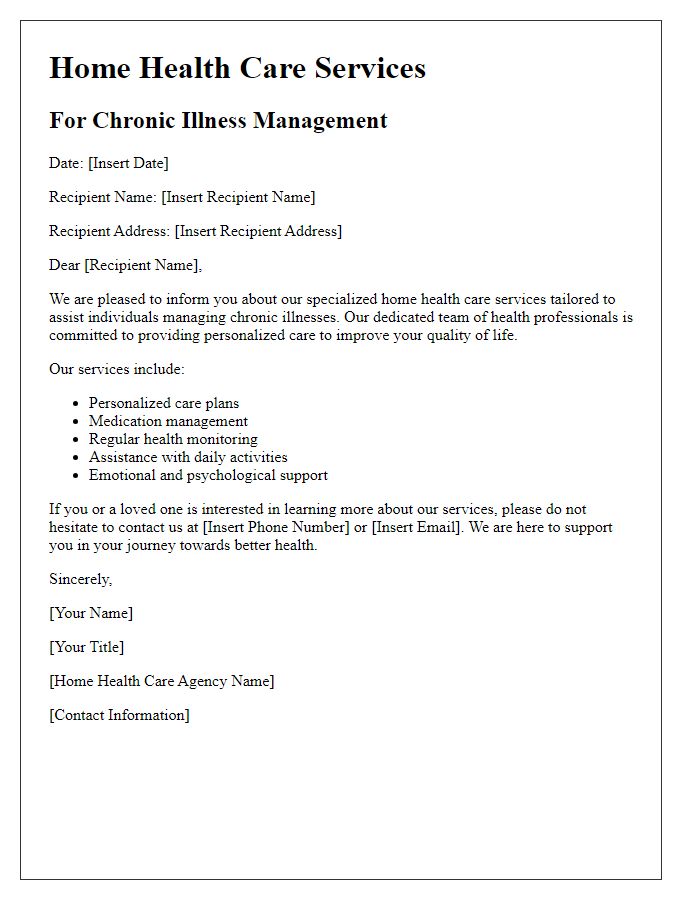
Letter template of home health care services for rehabilitation therapies.
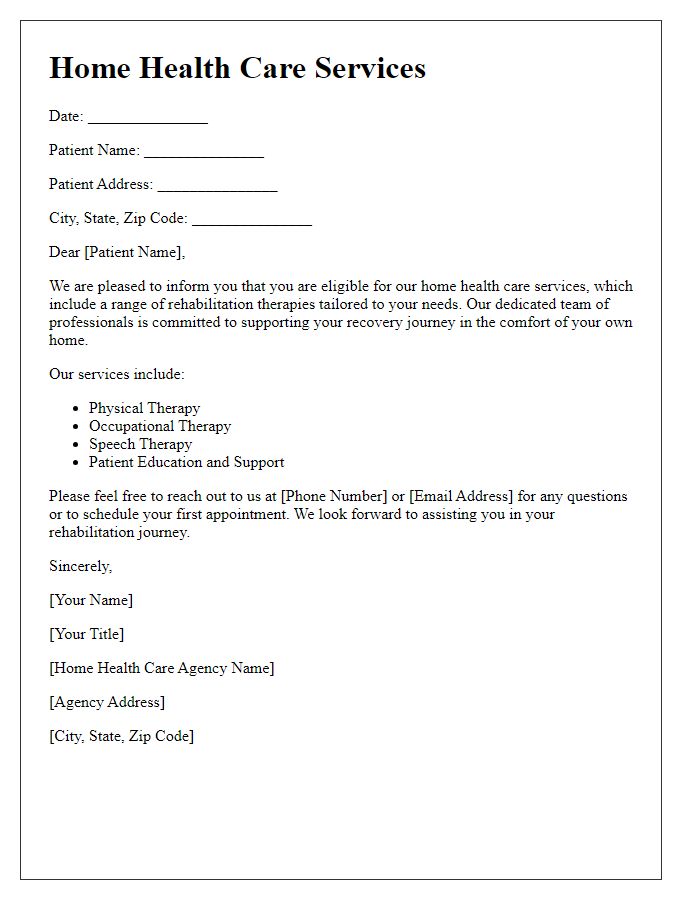
Letter template of home health care services for assistance with daily activities.
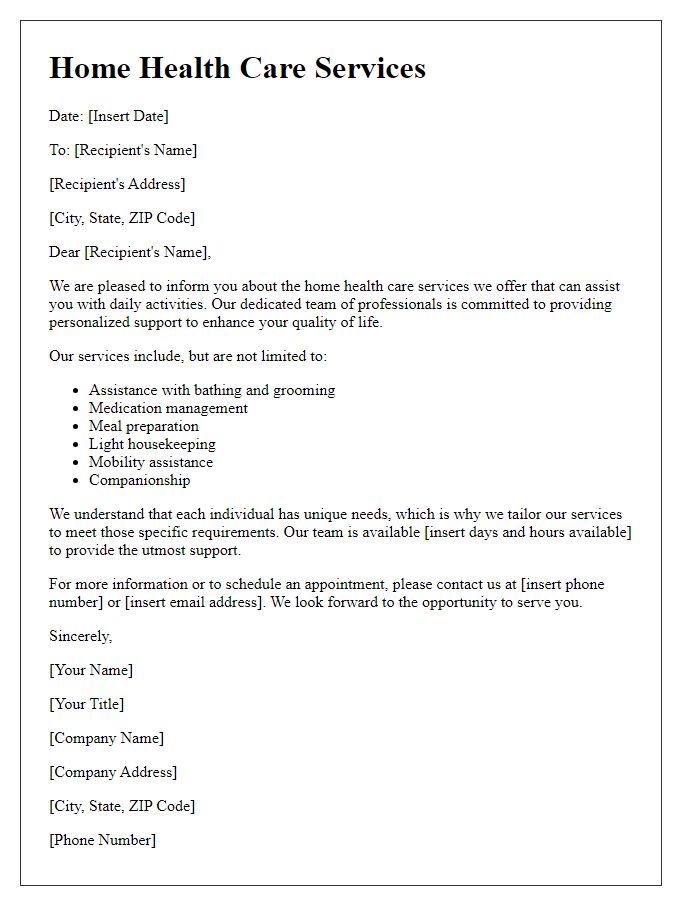

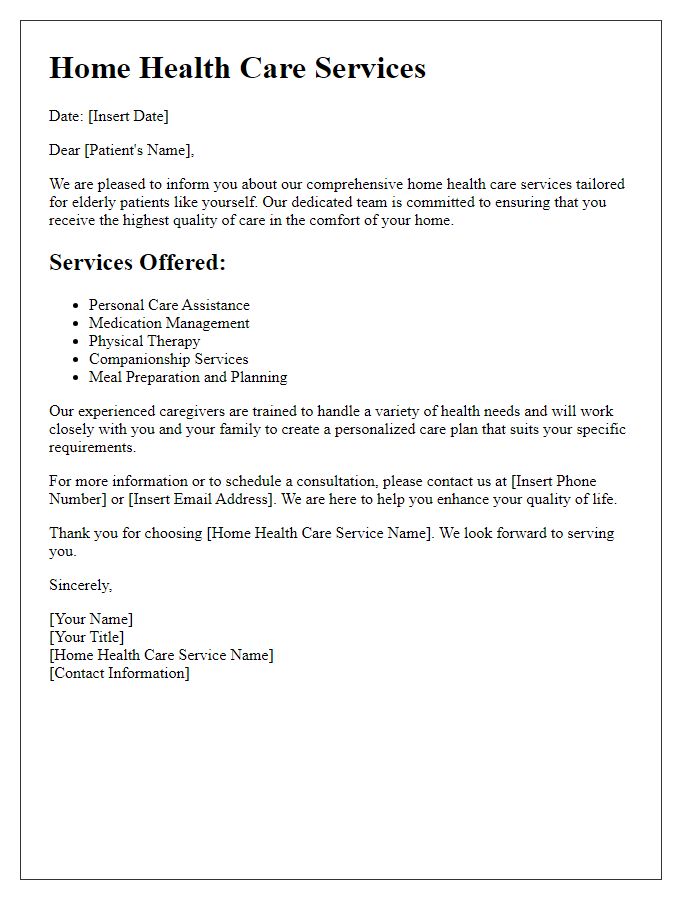
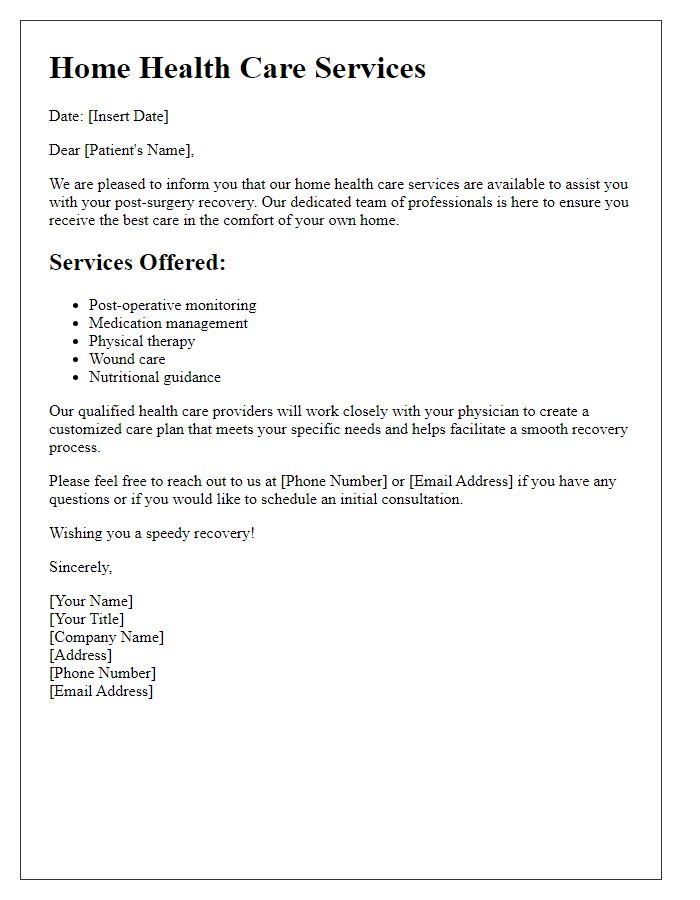
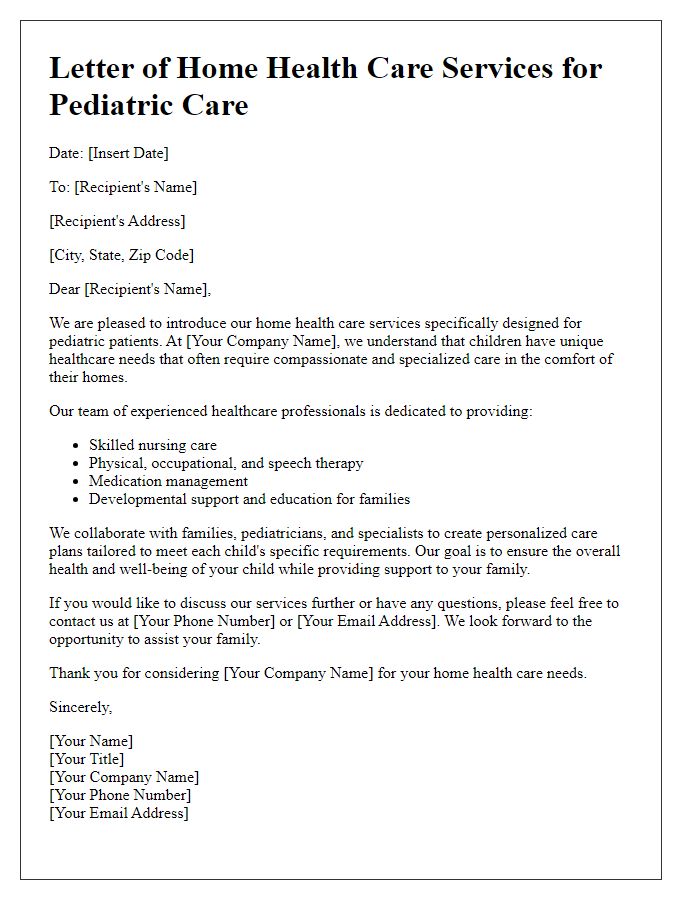
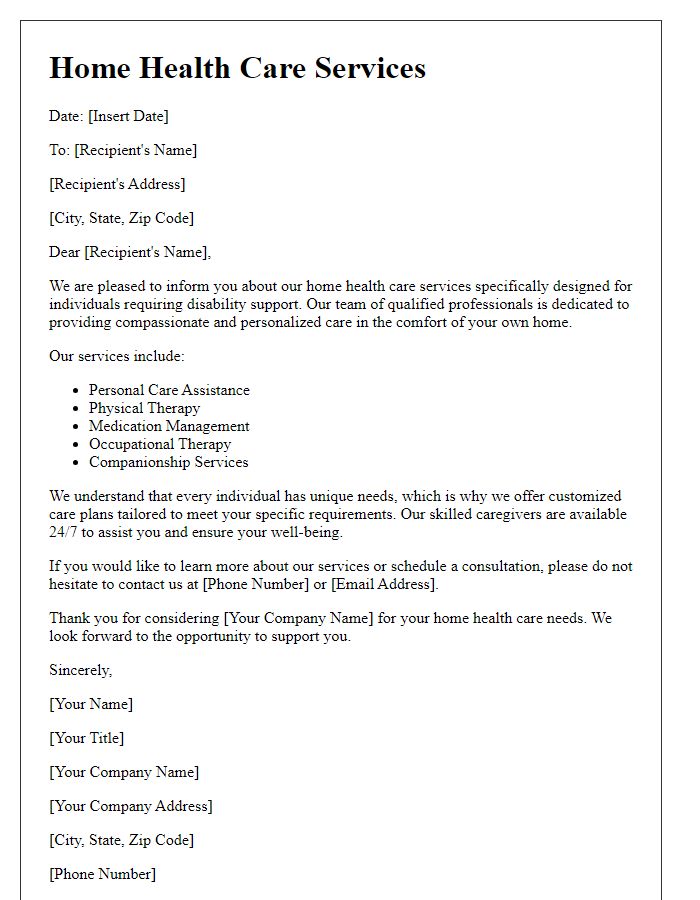
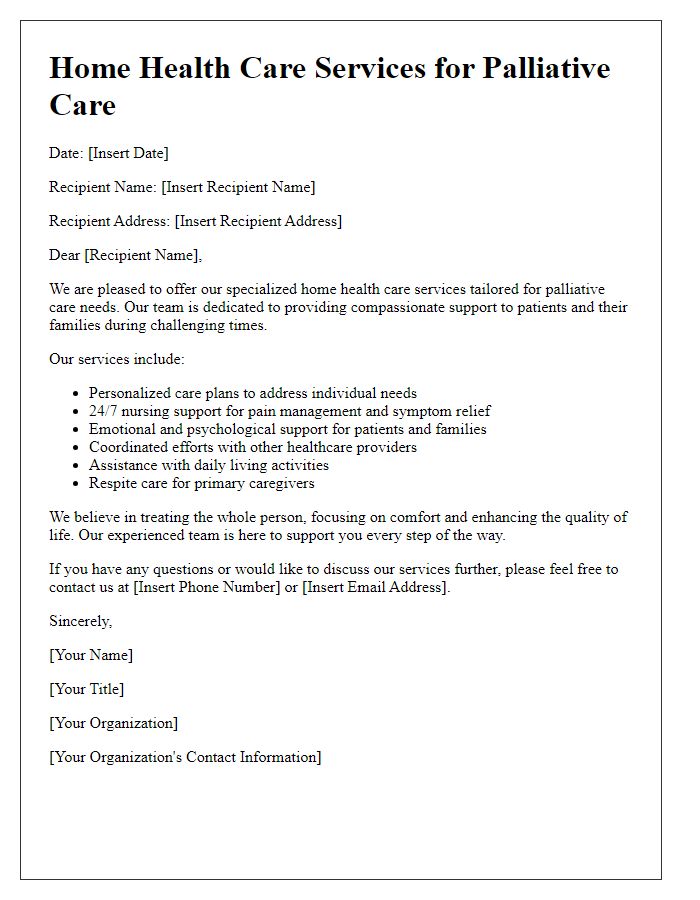

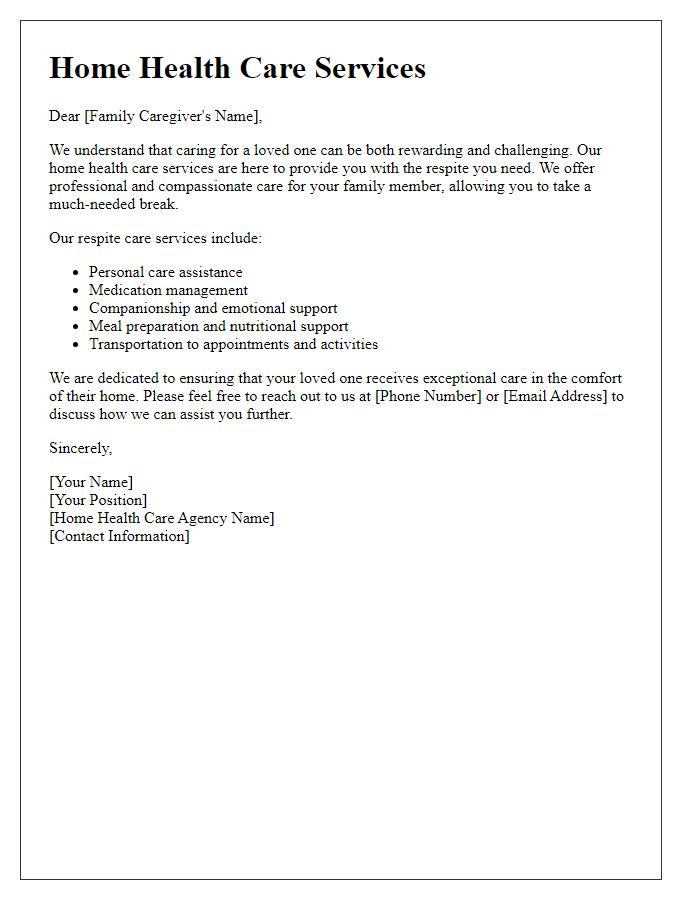


Comments